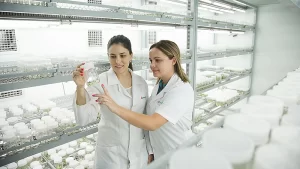How Israel became a hub for AgTech startups
Published: 15.04.2019 y., 10:26 | Author: Kuzmenko Artem
Source of text, photo and (or) video: https://agfundernews.com , https://aggeek.net
 Even before the state was established, the Israelis settled on land utilization by innovative methods, which, after 70 years after the country’s emergence, gave birth to the agtech sector.
Even before the state was established, the Israelis settled on land utilization by innovative methods, which, after 70 years after the country’s emergence, gave birth to the agtech sector.
Israel – the leading center for developing innovative solutions in the context of world agtech development. There are about 750 startups in the agtech sector and the food industry that optimize agricultural processes and food production.
With its own technology ecosystem, the «nation of startups» was able to create many successful innovative solutions and companies. How could Israel achieve this? How will multinational companies entering the market affect the development of the next generation of farming?
Combining knowledge.
For the greenery of the desert, the founders of Israel have instilled a mentality that, together with a powerful state system of innovation, has become the foundation for success in agtech. In the 39 years before independence, the settlers created in 1909 the first kibbutz, a community with a collective ownership of the means of production.
Kibbutz’s mentality was based on shared land use, the pooling of scarce resources, their effective use and the resolution of such heavy farm tasks as irrigation and efficient production.
Due to the kibbutz, a number of the most notable innovation companies arose, including:
Beeologics, working with bees and innovative dusting techniques;
Algatech, which grow algae for consumption and treatment.
Israel – a country without trading neighbors – had no choice but to start developing innovations in order to survive. The country had a desire to create an effective agro-sector, and invested in the development of drip irrigation system and other tools of sustainable agriculture.
The Volcani Agriculture Institute, a branch of the Ministry of Agriculture and Rural Development of Israel, promotes the development of the agro-sector, providing opportunities for research and training for scientists and farmers.
Or the Faculty of Agriculture, Food Products and the Environment The Hebrew University of Jerusalem, which was set up before the state was established to increase economic power and productivity of agriculture.
Both institutions are pillars of the Israeli agrarian sector and drivers of the development of innovative technologies. Many scholars have studied at The Hebrew University, among them the famous Oded Choseyev, who works with nanotechnology. He has created 10 companies based on their own inventions and technologies, including Futuragene. This company is engaged in the development of plant technology and has recently been sold for $ 100 million.
Concentration of capital.
The source of agtech’s success is not only in kibbutz, educational institutions and even in the agriculture itself, but also in compulsory military service, where young people learn to use innovative technologies and strategically think.
The 8200 Israeli Defense Forces, which deals with cybersecurity and intelligence, has brought many top technical talents to the country. After completing military service, they created and led innovative companies in various sectors of the economy. Permanent danger during military service is taught to take risks and a team game that is necessary for high-tech business.
My story is quite typical for Israel – I’m coming from a farm family. My family moved here in 1910 and created one of the first farms in the country. They wanted me to become a farmer, but I chose the computer science. And only many years later, I felt ready to combine my skills with the skills of others to create Taranis.
Now the link between the small area of the country and its successes in innovations and technology is becoming more and more obvious. The proximity of a range of high-class academic, research and corporate institutions has created a closely linked network for human resource development. It is needed to set up interactions and conduct experiments on a small scale before fully implementing the decisions.
As for the amount of venture capital investments, and at the high cost of the dollar, it is clear that the system adopted in Israel, works. The country has earned its name «nation of start-ups» by attracting more investment than any other EU country.
Big investments – the difficulty of choosing.
With the success of the Israeli agtech, international investors also wanted a piece of cake. In 2017, Israel earned $ 24 billion in technology sales and $ 5.2 billion by raising funds for launching startups.
Israeli technologies are popular and the agricultural sector is no exception. Recently, China and Israel have entered into a $ 300 million trade deal to increase exports of environmentally sound technologies.
ADAMA Agricultural Solutions has given another example of global market interest in Israeli agtech. This company, the leader in the production of CZR, has developed an innovative mix of fungicides for rye soya and became the first such company publicly acquired in the Chinese stock market.
The recognition and authority of Israeli business among foreigners helps small companies to climb through investments and inflows into larger companies. At the same time, it causes a crisis of identity in many startups that are torn between their own anti-bureaucratic ideals and the desire to grow their business.
Business scaling leads to new jobs and to diversification of experience and abilities, but also the startups themselves. Currently, local companies are looking for opportunities to influence, while remaining independent, but this is impossible, although it gives them time to mature. A small company needs, even if it is not absorbed by a multinational corporation, to balance its expectations and needs in their business models and business processes.
Perspectives.
The start-up dilemma is like a small country with a great innovative potential, but Israel’s success is not as paradoxical as it seems. The small size of the country and the limited resources have led the Israelis to highly developed innovative solutions.
The development of agriculture and technological ecosystems is a consequence of the culture of invention and the desire of a small country to have a competitive edge in the international market.
Agriculture and technology in Israel developed in symbiosis, which gave rise to the growth of many leading agtech companies. The exit of international companies into the local market gives start-ups the opportunity to expand their influence. This requires entrepreneurial and technological dynamism to fit the needs of a global marketplace that is interested in Israeli innovations.

 Українська
Українська Русский
Русский
